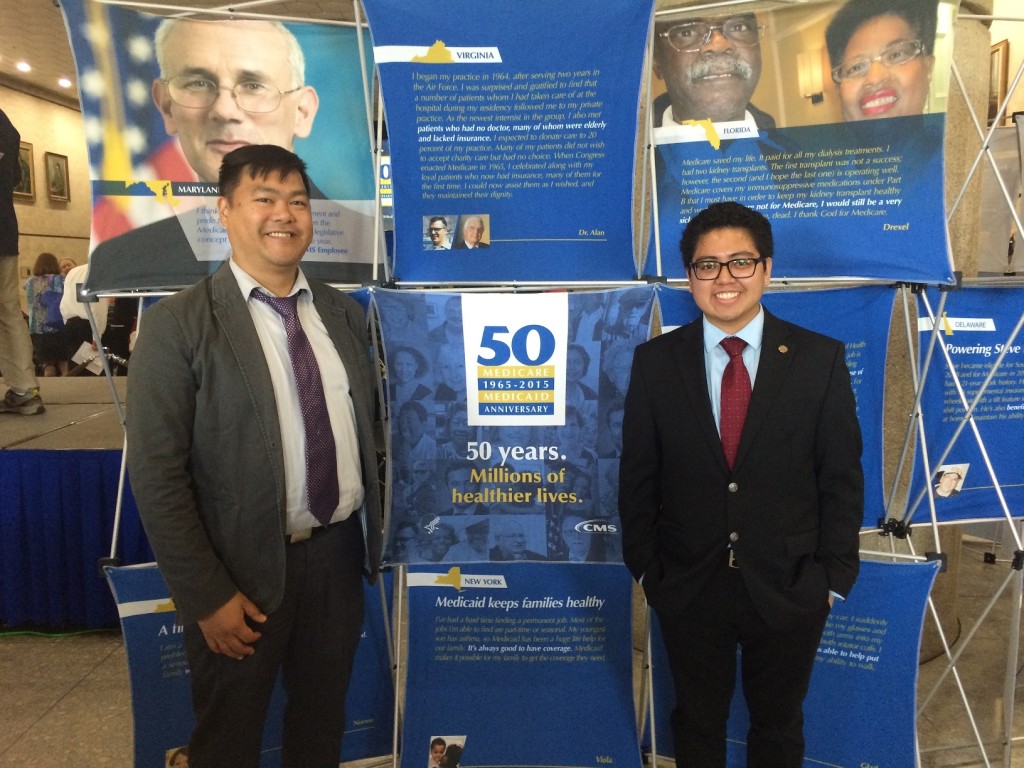It’s quite hard to believe that my time here at the Diverse Elders Coalition is almost over. Today is my last day, and as I wrap up a couple of final tasks here and there, I can’t help but reflect on and feel so fortunate and grateful for the past ten weeks. Collaborating with DEC staff and member organizations has been truly inspiring and empowering.
It’s fortuitous that I was able to work in D.C. during this particular summer. It’s been a special season, especially for those “fighting the good fight” and advocating for social justice because this summer marks multiple milestones and victories that support our diverse communities. In the past two weeks, we commemorated the 25th anniversary of the American with Disabilities Act, the landmark legislation that established that no one should live in indignity just because of a disability, alongside the 50th anniversary of Medicare and Medicaid, two significant programs that ensure access to healthcare for older, lower-income, and/or people with disabilities. And in the coming week, we will celebrate the 80th anniversary of Social Security, which has been a lifeline for those already on the margins of society from poverty.
 On July 14th, on the same day as DEC’s congressional briefing and a day after the White House Conference on Aging, a rare decennial event that also took place this summer—we celebrated the 50th anniversary of the Older Americans Act, a historic bill passed in 1965 to secure social services (such as food delivery programs, caregiver supports, elder abuse prevention efforts, and many, many more) for elders. The Act promotes the independence of older adults and ensures that they can age in dignity.
On July 14th, on the same day as DEC’s congressional briefing and a day after the White House Conference on Aging, a rare decennial event that also took place this summer—we celebrated the 50th anniversary of the Older Americans Act, a historic bill passed in 1965 to secure social services (such as food delivery programs, caregiver supports, elder abuse prevention efforts, and many, many more) for elders. The Act promotes the independence of older adults and ensures that they can age in dignity.
Commemorating these anniversaries and celebrating progress made is crucial in the fight for justice and equity for all. The critical programs and bills we honor this summer were born of pain, struggle, and sacrifice; their signing into law was the direct result of the relentless resistance of advocates and other individuals, many of whom were marginalized and silenced by society themselves. By commemorating these milestones, we honor their sacrifices and remind ourselves of the possibilities for impactful change that can happen through the combination of collective action, vision, and passion.
But part of celebrating such policies and their legacies is also about being honest about their limitations and the remaining “ways to go.” For example, despite delivering lifesaving and critical programs, the OAA has yet to be fully reauthorized—it was due to be renewed in 2011. A reauthorization bill has just passed the senate last month and is now making its way to the House. This is evidently exciting and necessary progress—but as we advocate for reauthorization, we must also not forget that the reauthorization of the OAA presents us with an opportune moment to better the bill. We must strive to make it more inclusive, more comprehensive, and more accessible.
One way we can do this is by passing the LGBT Elder Americans Act of 2012 which amends the OAA to include and address the voices and needs of LGBT elders. While it is true that historic wins have been made for LGBT people in this country, especially just this past summer when the Supreme Court made same-sex marriage the law of the land, there still are far more progress to be achieved. LGBT elders face multiple unique challenges as a result of a lifetime of systemic discrimination. For example, LGBT elders face high rates of isolation and depression, on top of lacking strong social support systems and affordable, culturally competent, and safe housing. And for LGBT elders who are at the intersections of racism, xenophobia, sexism, homophobia, and transphobia, and LGBT elders with HIV—the realities are even starker.
The reauthorization of the Older Americans Act must be achieved. But the Act must also be revised to accommodate the rapidly-shifting landscape of America where we see the nation “graying”—as a result of baby boomers hitting retirement age in large numbers on the daily—and “browning”—as our country becomes more culturally, racially, and ethnically diverse. This beautiful shift in our society we must welcome and celebrate—much like we do with the victories highlighted by this anniversary-filled summer—and translate such positive and powerful energies into sustained action, remembering that we do, in fact, have a long way to go.
In the same way that these anniversaries inspire us to continue moving forward, working with the Diverse Elders Coalition has empowered me to keep on marching on. I am tremendously grateful for the past ten weeks. Working with the Coalition to ensure safe and dignified aging for diverse elders like many of my relatives has taught me so much and made me feel more energized than ever to continue advocating for social justice and equity. I feel confident and excited to trek the “long way to go,” knowing full well that there are numerous friends like the Diverse Elders Coalition who are—and have been—doing so, so tirelessly along the way.
Till next time.
The opinions expressed in this article are those of the author and do not necessarily reflect those of the Diverse Elders Coalition.

